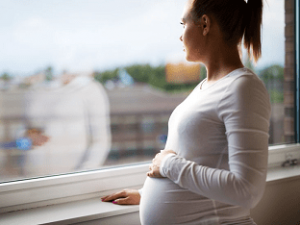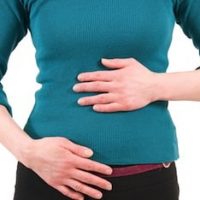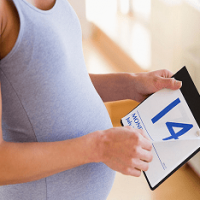 Falling is the one thing pregnant women must be most cautious of and are pretty much scared of. But an accidental fall during pregnancy which can be both alarming and dangerous is not uncommon.
Falling is the one thing pregnant women must be most cautious of and are pretty much scared of. But an accidental fall during pregnancy which can be both alarming and dangerous is not uncommon.
The studies in this field have shown that around 27% of women misstep at least once during their pregnancy. 10% of women fall more than once during their pregnancy period. Another annoying fact is that 29% of trauma in pregnancy are caused due to falling down or slipping.
Slipping Or Falling During Pregnancy – Common Misconceptions
There are several misinterpretations about falling during pregnancy. Some of the false notions that you should ignore are:
- Most of the falls lead to miscarriage.
- Fractures may occur in the unborn baby.
- Baby’s brain can get affected.
- The uterus and fallopian tube of the mother get irreversibly damaged.
What Are The Reasons For Falling Down During Pregnancy?
Some of the reasons that increase the chances of falling during pregnancy are:
- Shifting of the center of gravity due to the growing bump makes it difficult to balance the body especially on uneven surfaces.
- Increased weight in middle part of the body.
- Pregnancy hormones which help to relax the joints and ligaments, which helps tissues in pelvis and cervix to stretch during delivery, however loses the joints makes easily off balance yourself.
- Low blood pressure and low blood sugar which are common during pregnancy, makes women feel dizzy and loose balance.
- Swelling of the feet can make the steps clumsy.
Can Falling During Pregnancy Harm The Baby?
If you are not badly hurt yourself due to the fall, the chances are less for your baby to get hurt. This is because he is well protected with:
- Amniotic fluid which acts as a cushion.
- Amniotic sac.
- Thick and masculine wall of the uterus.
- Abdominal fats.
- Abdominal muscles.
- Pelvic bone.
Hence, for small accidents involving slip and falls the baby may not even feel anything at all. But, if the injury is severe enough to seriously hurt you, then the baby can also get affected directly or indirectly.
What Determines The Level Of Danger Of Falling During Pregnancy?
How serious is the impact of falling down during pregnancy is determined by mainly three factors:
- Age of the pregnant woman: The older the pregnant woman the chances of complication increases. Immediate medical attention should be given even though she shows no alarming symptoms.
- Pregnancy stage: On which stage of pregnancy the fall occur is an important factor that determines the impact. The risk factor increases with the later trimesters.
- Position of fall: It is too dangerous to fall flat on the stomach other than falling on the back or side.
What Is The Impact Of Falling Down On The First Trimester Of Pregnancy?
In early pregnancy, the uterus is tucked in the pelvis and is well protected by the pelvic bones. So during the first trimester falling down has less impact on the baby or placenta. If you do have an accident wherein you have slipped, just lie down and relax for some time. But if you are still anxious and develop some abdominal or back pain then visit your doctor. The reassurance from your doctor can make you feel less anxious.
Is It Dangerous When I Fall Down On The Second Trimester Of Pregnancy?
Once you get into your second trimester, the uterus is not tucked in the pelvic bone. But all the other covers of protection are still there to shield the baby from harm.
Relatively some complications can arise when you fall during the second trimester of pregnancy especially if you fall on your stomach. Seek medical attention if:
- You develop severe pain after the fall
- There is vaginal bleeding or spotting
- You fall on your stomach
- The movement of fetus is decreased
- You feel dizzy or breathlessness
- You develop uterine contraction
- You develop tenderness in your abdomen
Once you develop some of the above symptoms, you should seek medical attention. Your doctor will examine you and monitor your baby to make sure all is well.
What Happens When I Fall Down On The Third Trimester Of Pregnancy?
As the pregnancy progresses, the chances of the fall harming the mother and baby also increases. More over the women are more prone to fall as the fatigue and clumsiness increases towards the end of pregnancy.
During your last trimester, you may not be able to avoid the danger due to a fall as easily as your first trimester. If the fall is severe enough to generate a problem, the damage will occur most probably to the placenta. A trauma to the abdomen increases the chances of pulling the placenta away from the uterine wall. The warning signs includes:
- The amniotic fluid starts to leak
- Vaginal bleeding or spotting progressing to bleeding can occur
- The fetal movement may decrease
- Sensations of dizziness or sense of fainting increases
- You might experience shortness of breath
- Cramping or contractions of the uterine wall
- Severe abdominal pain
Premature labor is the usually associated with the fall that occurs in the third trimester of pregnancy.
Even if you don’t develop the above symptoms go ahead and consult your practitioner. Your doctor will definitely go for an ultra sound to make sure the safety of you and baby.
Preventing Accidents Of Slipping During Pregnancy
Though not completely, we can stay away from accidents if proper precautions are taken.
- Most of the accidents of slipping happens in wet areas, likely in the bathroom and kitchen. Pay more attention when you are taking a bath. Water and soap is a deadly combination that makes the bathroom floor more slippery. However you could use a wet anti-skid tape and make your bathroom slip-proof. Easy to use and cost effective, we strongly recommend anti-skid tapes to be used during pregnancy.
- Use flat foot wear instead of heels as wearing a heels during pregnancy increases the risk of losing balance.
- Select the footwear with non-skid soles.
- Steady yourself against something strong or sit down when you start to feel dizzy.
- Be extra careful during the rainy season (or during snowfall).
- Hold tightly on the rails while climbing down or climbing up.
- If there is nothing to support you don’t be shy about asking for a hand whenever you feel.
- Put non-slip bathmats on the door and put non-skid mats inside the shower or tub. This will minimize the risk of falling down.
- Walk slowly.
- Do not walk on newly washed or waxed floor.
- If you exercise choose ones which are absolutely safe.









